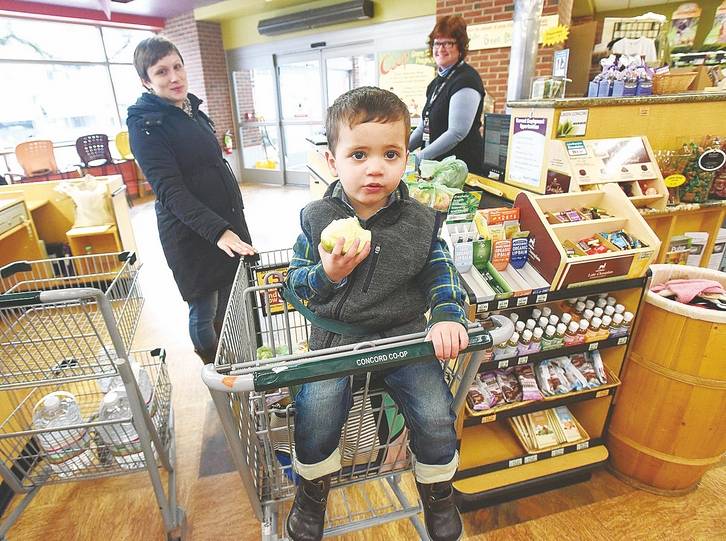
Demand for Healthier Food Boosts Co-Op Memberships
CONCORD — Organic eggs arrive from Hopkinton 11.3 miles away, honey from Merrimack 25.9 miles away and mushrooms from Tamworth 63.2 miles away.
Those mileposts hang above produce shelves in the Concord Food Co-op, advertising the farms and farmers supplying the South Main Street store.
January 31, 2016 | Source: New Hampshire Union Leader | by Michael Cousineau
CONCORD — Organic eggs arrive from Hopkinton 11.3 miles away, honey from Merrimack 25.9 miles away and mushrooms from Tamworth 63.2 miles away.
Those mileposts hang above produce shelves in the Concord Food Co-op, advertising the farms and farmers supplying the South Main Street store.
“It all keeps you healthier buying healthy food,” said 77-year-old Mary Otterson of Newport while shopping there last week. “I like organic because with organic, you’re going to get more nutrients from it.”
A push by the public for healthier food — and for knowledge of where it comes from — is boosting food co-op memberships and motivating more groups to look at forming co-ops.
The membership ranks are up 36 percent at the Concord co-op compared to five years ago. The one-time $100 membership, which makes you a part owner, isn’t required to shop there, but members, which make up half the store’s traffic, get access to discount days and special pricing on some items, he said.
“They want to have a voice in the products that are here,” said Greg Lessard, director of development at the Concord co-op. It recently added bulk spices, for example, to satisfy customer demand.
The Concord co-op, which offers only organic and natural products, recently met with about 30 produce growers to reserve “a certain percentage of their fields for us,” said Shane Smith, store manager and grower liaison. They locked in the price, quantity and delivery schedule for the organic produce grown without use of synthetic pesticides.
A co-op trying to take root in the Manchester area, the Manchester Food Co-op, recently announced plans to take over the Harvest Market location in Bedford on Route 101 and create a hybrid co-op, offering processed foods as well as organic items.
“The idea is to keep the conventional items people love,” said Project Manager Heather Avella. “We want to embrace the customers already shopping the store and to be inclusive.”
The Bedford project requires signing up 2,000 members (1,087 already committed as of last week) and raising $1 million in loans from members before opening the store, perhaps as soon as mid-summer, she said.
Another group is looking to organize a co-op in the Souhegan Valley, according to the group’s president, Michael Conley.
The group is interested in the Wilton area and hopes to raise $20,000 to pay for a feasibility study this year with the goal of opening a store in late 2017.
Asked about the plans for the Bedford co-op, Conley said: “If it affects us, it would probably push us further west.”
The Hanover Food Stores, with stores in Hanover, Lebanon and White River Junction, Vt., also operates under a hybrid model.
“Our members vote with their dollars,” said Allan Reetz, director of communications. “If they’re choosing to buy Kellogg’s Corn Flakes or choosing to buy granola or tofu or good bacon, that’s what they’re choosing to do.”
Membership at the Hanover co-op grew 18.5 percent to 40,242 at the end of 2015 compared to 2010. About 53 percent of members actually made a purchase there last year.
For the fiscal year ending last January, the Hanover co-op banked nearly $75 million in sales and returned more than a half-million dollars in profits to members.
The co-op, Reetz said, is willing to take less profit from a farmer to buy a local pepper or head of lettuce, so the item can be priced competitively.
“We’re not buying to maximize profits,” he said. “We’re buying to maximize quality and value.”
The Hanover Food Stores use roughly 280 local and regional vendors from within a 100-mile radius that provide about 4,000 products, he said.
“That’s what you get out of a co-op,” Reetz said. “A strong farm economy is good for food security.”
Barry Brownstein of Thornton said items on his shopping list for the Concord store includes organic tea and high-quality whole wheat bread made at the Canterbury Bread Shop, items that he can’t easily find in large supermarkets.
He often waits for co-op items to go on sale, “so I’ll stock up,” he said.
“I buy the sales, so we eat by the sales,” said Concord resident Paula DeLisi, who gets a majority of her groceries there. “I feel the food is safer. With GMOs (genetically modified organisms), you don’t know what you’re getting.”
Organic and food from local producers are “quite popular” with shoppers, according to Gail McWilliam Jellie, director of the state’s division of agricultural development.
“We do work to encourage retailers of all types to include more local products in their offerings,” Jellie said.
This spring in Bedford, a Whole Foods store will open at 121 S. River Road while a new larger Hannaford store on Kilton Road will replace a smaller one on Colby Court.
Hannaford Supermarkets, which has about three dozen stores in New Hampshire, offer organic products and items grown or raised within the state, according to spokesman Eric Blom.
“In particular, what we’ve been doing in the last year or so, is to better emphasize” it, he said.
Asked about competition, Blom said: “We’re trying to keep prices low every day for our customers. We have competitors for all of our markets, a variety of different competitors.”
